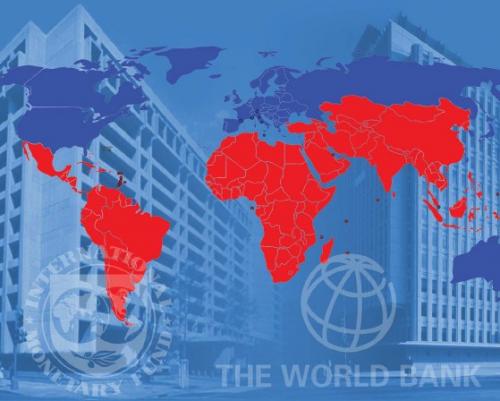The Bretton Woods Twins: Time for an Exit Strategy for the Global South?
- Análisis

As they mark their 76th year, the International Monetary Fund and the World Bank have been presented with a grand opportunity, not to save the world, but to salvage their tattered reputations.
The Fund enters the annual IMF-World Bank meetings with a big image problem. Under Christine Lagarde, the former Managing Director, the Fund served as a member of the so-called Troika that had imposed what can only be described as savage austerity programs in Ireland and Greece. The IMF’s role in saving European banks by squeezing the Irish and Greek peoples of the resources to pay them had shown that it had not changed its approach to economies in crisis: cut government budgets, fire people, and channel savings from this draconian process to pay off private sector creditors. These “pro-cyclical” measures are to be adopted Covid-19 presented the Fund with a chance to clean up its image, and it boasted of a $1 trillion war chest that Managing Director Kristalina Georgieva said it was ready to disburse to meet a “once in a lifetime pandemic.” However, developing countries have been, for the most part, circumspect in their response to the Fund beckoning them to borrow. A close examination of the Fund’s initiative shows the reasons why: the Fund is offering loans, not grants; its “debt relief” initiative is really just a refinancing of loans; accepting a loan will subject a country to the same dreaded Fund conditionalities and surveillance that accompany regular IMF loans. Getting a loan, in other words, is likely to get the recipient into a similar situation as that in which Ireland and Greece found themselves.
The World Bank, for its part, enters the fall meeting backing the IMF in spurning the widespread call for debt cancellation, with its new president, David Malpass, saying that the financial markets won’t like that. It is also facing charges of hypocrisy: on the one hand, warning that the world faces a world hotter by four degrees at the turn of the century; on the other, still engaging in investments in coal plants. It is also bogged down in controversies over its engagement in the REDD+ initiative, which threatens to dispossess forest communities throughout the world in the name of saving forests as carbon sinks.
The Bank used to be the loudest cheerleader for globalization and trade liberalization. It still supports these processes but its advocacy is now more muted. The reason for this is that over the last few years, globalization and trade liberalization have brought about conditions that have contradicted all the rosy assertions of the Bank’s research: greater inequality within countries, better performance by countries’ managed markets instead of liberalizing their economies; and an increase in global carbon emissions owing to trade liberalization. emissions.
The policies of the Fund and Bank continue to respond mainly to the interests of the United States and Europe, which hold an effective controlling share of voting power in the two institutions. The US and Europe also continue to exercise the feudal privilege of appointing the heads of the Bank and the Fund, respectively. There have been strong calls for reform of the policies and governing structures of the Fund and the Bank over the last 50 years. In both areas, there has been, at the most, marginal and very cosmetic change. The consistent stonewalling of real change by the hegemonic powers calls into question the strategy of demanding reforms on the part of the countries of the global South. Probably more productive at this point would be strategizing for a collective exit from the two institutions and exploring ways of building up alternative institutions grounded in the principles of mutual respect, genuine cooperation, and equality to coordinate international finance, trade, and development assistance in an era of climate crisis. Current geopolitical and geo-economic realities might, in fact, make the possibility of success greater for such an approach.
Continue reading below…
Source: Focus on the Global South. https://focusweb.org/publications/the-bretton-woods-twins-in-the-era-of-covid-19-time-for-an-exit-strategy-for-the-global-south/
Del mismo autor
- Agrocide in the Philippines and how to stop it 13/08/2021
- Philippine agriculture is dying, what will it take to save it? 10/08/2021
- The Rise and Fall of Multilateralism 14/04/2021
- David slays Goliath in El Salvador 19/03/2021
- Leer a Piketty I: Un resumen conciso y exhaustivo de Capital e Ideología 12/03/2021
- Lecture de Piketty I: Un résumé concis et complet de Capital et idéologie 03/03/2021
- Reading Piketty II: Property, Ideology, and the Mystery of the Missing John Locke 23/02/2021
- Reading Piketty I: A Concise and Comprehensive Summary of Capital and Ideology 19/01/2021
- El asalto al Capitolio indica que EE.UU. ha entrado en la era de Weimar 07/01/2021
- United States: Storming of Capitol shows America has entered the Weimar era 07/01/2021
Clasificado en
Clasificado en:
Crisis Económica
- Geraldina Colotti 07/04/2022
- Julio C. Gambina 07/04/2022
- Rafael Bautista S. 06/04/2022
- Julio Gambina 04/04/2022
- José Ramón Cabañas Rodríguez 01/04/2022
Poscovid19
- Alastair Crooke 11/01/2022
- Michael Roberts 03/01/2022
- Armando Negrete 24/08/2021
- Armando Negrete 24/08/2021
- Boaventura de Sousa Santos 27/07/2021
